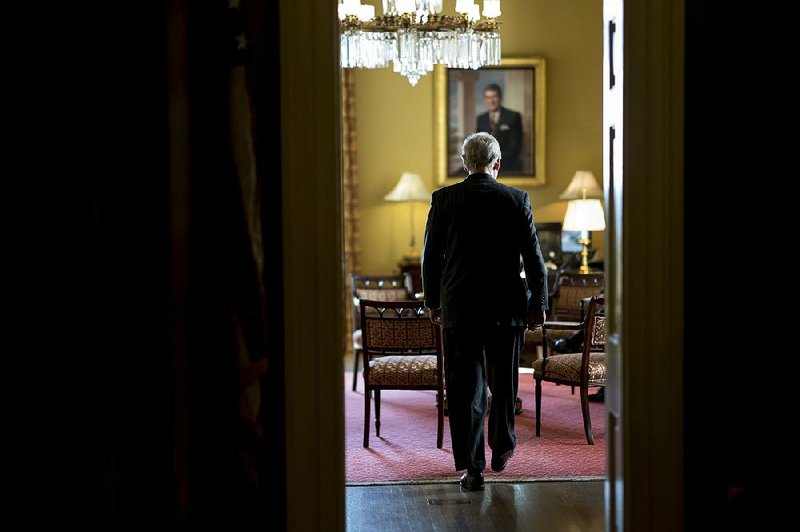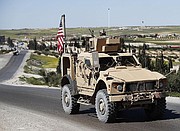WASHINGTON -- A day after he pushed back against U.S. intelligence agency chiefs over their assessments of global threats, President Donald Trump reversed course Thursday and said that he and the intelligence community "are all on the same page."
Trump on Thursday met with his director of national intelligence and other top security officials in the Oval Office and said afterward that they told him their testimony at a Senate hearing had been "mischaracterized" by the news media.
House Speaker Nancy Pelosi and other Democrats had slammed the president for his comments disparaging Director of National Intelligence Dan Coats, CIA Director Gina Haspel and other top security officials.
The officials told Congress on Tuesday that North Korea is unlikely to dismantle its nuclear arsenal and that the Iran nuclear deal is working, contrary to what Trump has claimed.
In an interview with The New York Times published Thursday night, Trump said the intelligence chiefs told him their presentation was misinterpreted.
"They said, 'Sir, our testimony was totally mischaracterized,'" he said. "I said, 'What are you talking about?' And when you read their testimony and you read their statements, it was mischaracterized by the media."
"They said it was fake news," Trump told reporters earlier at the White House.
Coats and other officials presented an update to the Senate Intelligence Committee on Tuesday on their annual assessment of global threats. In a public report and testimony broadcast on C-SPAN, they warned of an increasingly diverse range of security dangers around the globe, from North Korean nuclear weapons to Chinese cyberespionage to Russian campaigns to undermine Western democracies.
Trump tweeted Thursday that he and the intelligence leaders "are very much in agreement on Iran, ISIS, North Korea, etc." and that he values their service.
"Happily, we had a very good meeting, and we are all on the same page!" he tweeted.
Pelosi, D-Calif., told reporters that the intelligence officials were "courageous" in speaking "truth to power" by publicly contradicting Trump.
"One dismaying factor of it all is that the president just doesn't seem to have the attention span or the desire to hear what the intelligence community has been telling him," Pelosi said Thursday, calling Trump's comments attacking the intelligence leaders "cause for concern."
Trump tweeted that intelligence officials were wrong about North Korea, Iran and the Islamic State, which they said remains a terrorist and insurgent threat.
"Perhaps Intelligence should go back to school!" Trump tweeted Wednesday.
Pelosi said Trump's comments were "stunning."
"It's important for the Republicans in Congress to recognize they have to weigh in with the president to say, 'You can't act without knowledge,'" Pelosi said.
Senate Democratic leader Charles Schumer said it was "past time" for U.S. intelligence officials to stage an intervention with Trump.
In a letter to Coats, Schumer called Trump's criticism of intelligence agencies "extraordinarily inappropriate" and said it could undermine public confidence in the government's ability to protect Americans.
Schumer urged Coats and other officials to "educate" Trump about the facts and raw intelligence underlying threat assessments so the administration can speak "with a unified and accurate voice about national security threats."
Asked about his tweets earlier Thursday, Trump did not back away from questioning the assessment by Coats and Haspel.
"I disagree with certain things that they said. I think I'm right, but time will prove that, time will prove me right probably," Trump told reporters at the White House. "I think Iran is a threat. I think I did a great thing when I terminated the ridiculous Iran nuclear deal. It was a horrible one-sided deal."
Speaking about intelligence agencies generally, Trump added: "I have great respect for a lot people but I don't always agree with everybody."
At a hearing Tuesday, Coats said intelligence information does not support the idea that North Korean leader Kim Jong Un will eliminate his nuclear weapons.
Trump later insisted on Twitter that the U.S. relationship with North Korea "is the best it has ever been." He pointed to the North's halt in nuclear and missile tests, the return of some U.S. service members' remains and the release of detained Americans as signs of progress.
U.S. intelligence agencies also said Iran continues to work with other parties to the nuclear deal it reached with the U.S. and other world powers. In doing so, they said, Iran has at least temporarily lessened the nuclear threat. In May 2018, Trump withdrew the U.S. from that accord, which he said would not deter Iran.
"The Intelligence people seem to be extremely passive and naive when it comes to the dangers of Iran," Trump tweeted Wednesday. "They are wrong!"
SENATE REBUKES TRUMP
Separately, the vast majority of Senate Republicans backed Majority Leader Mitch McConnell on Thursday in a rebuke of Trump's rationale for withdrawing U.S. troops from Syria and Afghanistan, voting to declare that the Islamic State's continued operations in both countries poses a serious threat to the United States.
The 68-23 vote to cut off debate ensures that the measure, which was presented as an amendment, will be added to a broader bipartisan Middle East policy bill expected to easily pass the Senate next week.
The vote was the second time in two months that a Republican-led Senate had rebuked Trump on foreign policy. In December, 56 senators voted to end U.S. military assistance for Saudi Arabia's war in Yemen in what was the strongest show of bipartisan defiance against Trump's defense of the kingdom over the killing of a dissident journalist, Jamal Khashoggi.
This time, the vote was even more lopsided. Trump's declaration of victory over the Islamic State provoked a swift backlash on Capitol Hill in December when he announced that the United States would pull 2,000 troops from Syria and 7,000 from Afghanistan.
McConnell, usually a reliable ally of the president's, drafted an amendment warning that "the precipitous withdrawal of United States forces from either country could put at risk hard-won gains and United States national security."
Without directly invoking the president's name, McConnell countered Trump's policies, arguing that "it is incumbent upon the United States to lead, to continue to maintain a global coalition against terror and to stand by our local partners."
"I believe the threats remain," he said in a speech Thursday. "ISIS and al-Qaida have yet to be defeated, and American national security interests require continued commitment to our mission there," using an acronym for the Islamic State.
Senate liberals, many of them exploring presidential runs in 2020, including Sens. Elizabeth Warren of Massachusetts and Bernie Sanders of Vermont, voted against the measure, signaling a growing willingness in the party to question long-running conflicts. Warren, Sanders and Sen. Kirsten Gillibrand of New York, had endorsed Trump's decision to withdraw troops from Syria and Afghanistan.
"We've been in Afghanistan for a longer period than any war in American history; Syria, we've been there for too long and we've got to get out," Sanders told reporters Thursday. "What McConnell is saying is, 'Let's maintain the status quo.'"
Several senators have warned that Kurdish fighters who have operated in Syria would be left particularly vulnerable if the United States withdraws.
Sens. Marsha Blackburn, R-Tenn., a Trump ally, and Tammy Duckworth, D-Ill., who lost both her legs when her Army helicopter was shot down in Iraq, wrote to the president Thursday pressing him to develop "a comprehensive plan to protect our Kurdish partners serving in the Syrian Democratic Forces and prevent armed conflict between Kurdish forces and the Republic of Turkey." Blackburn represents Nashville, which is home to more Kurdish-Americans than any other city in the United States.
In the House, Reps. Tom Malinowski, D-N.J., and Mike Gallagher, R-Wis., unveiled two bills Wednesday that seek to bar the Trump administration from abruptly withdrawing troops from Syria and South Korea.
The bills prohibit the use of defense funds to reduce the number of active-duty troops serving in Syria below 1,500 and below 22,000 in South Korea, unless the defense secretary, the secretary of state and the director of national intelligence submit assurances to Congress that the withdrawals would not undermine the nation's security and that allied nations had been consulted, among other stipulations.
"This legislation makes a strong bipartisan statement that it would be reckless to pull troops from South Korea while North Korea still threatens our allies with nuclear and conventional weapons, and that if we are going to withdraw from Syria, we should do it with a plan, not a tweet," said Malinowski, who was assistant secretary of state for human rights in President Barack Obama's administration.
Information for this article was contributed by Matthew Daly and Darlene Superville of The Associated Press; by Karoun Demirjian of The Washington Post; and by Catie Edmondson, Peter Baker and Maggie Haberman of The New York Times.
A Section on 02/01/2019

